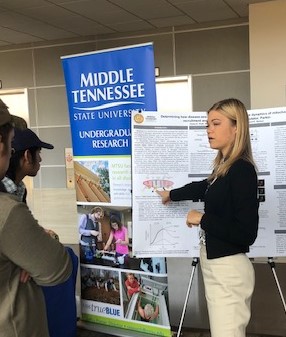SOAR Student Profiles

Gabriella Morin
- SOAR Position: Member; President (2020-21); Alumni
- Major: Biology & Spanish
- Faculty Mentor(s): Dr. David Nelson
Current Focus: Parkinson’s Disease-associated mutations in PINK1:Parkin Mitophagy Pathway
Project Description
My project works to quantify the effect that Parkin protein mutants, such as C431S, have on a quality control mechanism for mitochondria linked to juvenile Parkinson’s disease. I perform transient transfections of EYFP-tagged Parkin wild type and mutant into Parkin-null HeLa cells and track association and dissociation rates while depolarizing the outer mitochondrial membrane with a reversible protonophore. Additionally, my work deals with PINK1 expression level analysis after varying repetitions of transient depolarization in order to more accurately mimic conditions within the body.Why does this topic interest you?
Initially, when I heard about Parkinson’s disease (PD) research as a freshman, I was drawn to thinking about my father, who suffers from Essential Tremor. During my sophomore year in Honors genetics, I was able to understand more of Dr. Nelson’s project surrounding mitophagy pathways and their link to the loss of dopaminergic neurons. The biggest draw for me was that no matter what genes we have, we always have the power to optimize and change our genetic expression through lifestyle. Transient oxidative stress wreaks damage when we are exposed to pesticides and herbicides. eat inflammatory foods or indulge with inappropriate proportions, but when we love our bodies and take care of ourselves, chronic conditions dissipate.What are your professional aspirations?
With a background in international missions and community health, my goal is to further my impact by pursuing a joint medical doctorate and masters in Public Health program. I seek to serve underserved communities both in the United States and in Central America, giving back to the communities which supported and provided the way for my training.Do you have any advice for future researchers?
Don’t be afraid to ask questions. If you’re not asking questions, you’re not learning. Take incredibly detailed notes when you are first training, and as you progress, figure out what factors remain constant in a certain experiment or procedure, and what factors remain variables. Consolidate your notes as you become more comfortable with the structure, but always have your detailed set for review if needed. Also, I highly recommend that you buy a hard cover lab notebook. It will save you time when searching through your backpack, stabilize well when on your lap during experiments (especially helpful with culture labs), and it will hold up for your entire undergraduate career. Keep protocols and procedures in the front, and make it fun.


